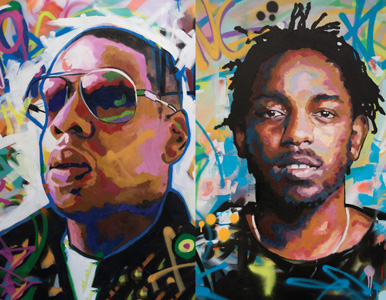
International Studies 306: Jay-Z and the Practice of Historical Biography
Can you imagine why someone sells drugs? Put yourself in the shoes of a young man from the projects who sees no other way to get by. What if, down the road, that same man not only finds another way but creates a foundation to help poor people of color go to college? Can you empathize with his situation, if not condone his behavior?
Context matters. That's the theme of Omekongo Dibinga's course on biography. Using hip-hop artist Jay-Z as a case study, the class explores how biography can reveal the circumstances of a subject's life and the societal forces that shaped them.
"Jay-Z says in his [biography]: 'To tell the story of the kid with the gun, without telling the story of why he has it, is to tell a kind of lie,'" says Dibinga, a professor in the School of International Service.
Students analyze some of the conditions that colored Jay-Z's upbringing-underfunded schools, rampant unemployment-and examine his lyrics born of a tough childhood spent slinging crack in Brooklyn.
Then, applying their new research skills, they delve into the biography of a historical figure, such as Fidel Castro or Mikhail Gorbachev, to explore another life in context.
The goal is to teach students to dig deeper to understand what makes someone who they are. "I want everybody to look beyond what the eyes and ears [tell] them about a person," Dibinga says.
African American and African Diaspora Studies 306: Black Men and Hip-Hop in US Popular Culture
Whether it's the harsh realities of Compton in the 90s, Fox News diatribes, or black identity-rapper Kendrick Lamar has a message that resonates from California to Black Panther's Wakanda.
In her new class, Professor Nikki Lane pairs Lamar's work with contemporary hip-hop studies to explore issues like African American masculinity and femininity, antiblack racism, and mass incarceration. Students examine how black men and hip-hop have been portrayed in popular culture over the last 40 years, using music as an avenue of analysis.
"When we're talking about [Tupac's] 2pacalypse Now, we're asking, what [did] America look like for black people in 1991?" says Lane, an adjunct in the College of Arts and Sciences. "Kendrick Lamar's To Pimp a Butterfly came out in 2015. What was happening in the United States at that time?"
Take Lamar's "Alright," an anthem for Black Lives Matter advocates. Against a backdrop of fatal shootings of unarmed black men in 2015, the song delivers a message of hope: "Do you hear me? Do you feel me? We gon' be alright."